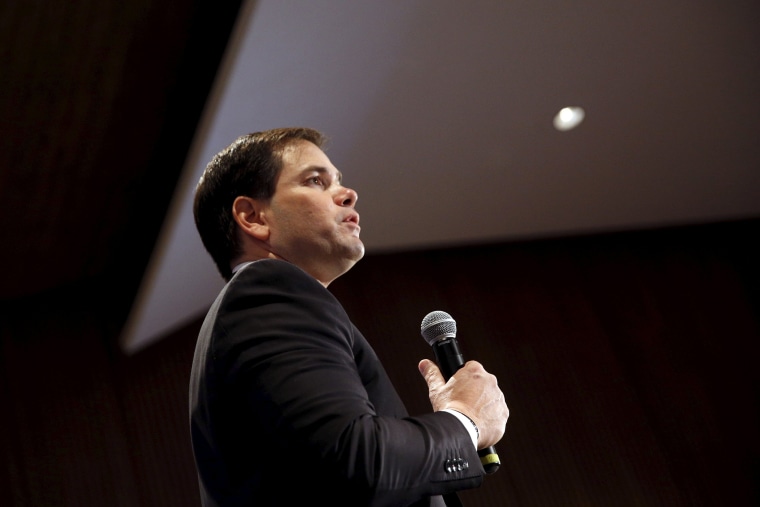Eight years ago at this time, there was a senator running for president en route to winning his party's nomination. He supported closing Guantanamo, banning torture, passing comprehensive immigration reform, and creating a cap-and-trade system to address the climate crisis.
That candidate's name was John McCain. His running mate endorsed the same platform. Her name was Sarah Palin.
The radicalization of Republican politics is not new, but it's easy to forget sometimes the speed with which the GOP headed over the right-wing cliff.
Vox flagged an interesting video, also from 2008, which helps bolster the point.
Back in 2008, when he was speaker of the Florida House, Marco Rubio wanted to give Florida's state environmental agency a "mandate" to design a "cap-and-trade or carbon tax program." That's from the short video clip below, which surfaced on YouTube this week, possibly posted by a Rubio rival in the hopes that it would hurt his GOP presidential bid.
The senator spent part of yesterday afternoon distancing himself from his previous flirtation with reasonableness -- and touting his endorsement from Senator Snowball.
The funny thing is, when Rubio said this in 2008, it seemed perfectly normal at the time. All kinds of Republicans saw a cap-and-trade model as a sensible, market-driven approach to an environmental crisis. The young Florida Republican assumed policymakers were going to do something, so he expressed support for a solution conservatives were comfortable with.
So what happened? President Obama endorsed the idea, at which point Republicans decided the proposal they used to support must be destroyed at all costs.
McCain denounced his own plan, Rubio became one of his party's most notable climate deniers, and cap-and-trade proposals joined the list of ideas that Republicans would never consider under any circumstances.
Part of this is important because of what it tells us about Marco Rubio. The senator has always been far-right, but in the not-too-distant past, he was a Republican who saw value in cap-and-trade, supported comprehensive immigration reform, and was skeptical of the GOP's neoconservative worldview. Hoping to appeal to right-wing voters, Rubio now believes the exact opposite on each of these issues.
When conservatives question whether they can fully trust Rubio, their skepticism is hardly unreasonable.
But part of this is also emblematic of the Republican Party's direction in general. Consider how difficult it is for the parties to find common ground when one of the major parties -- the only major party in any advanced democracy on the planet -- rejects climate science entirely, and is offended by the very proposals the party's mainstream used to support.
